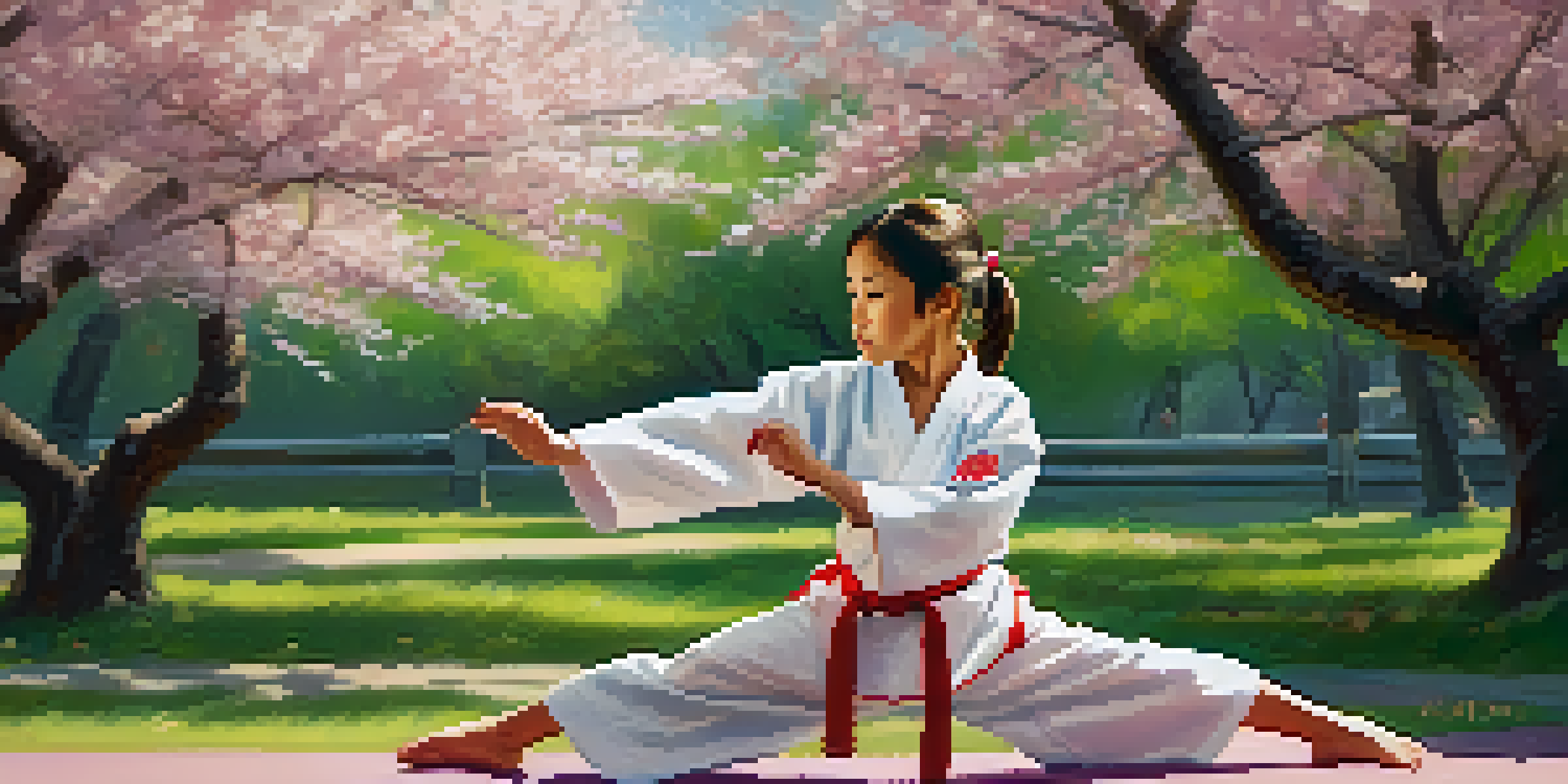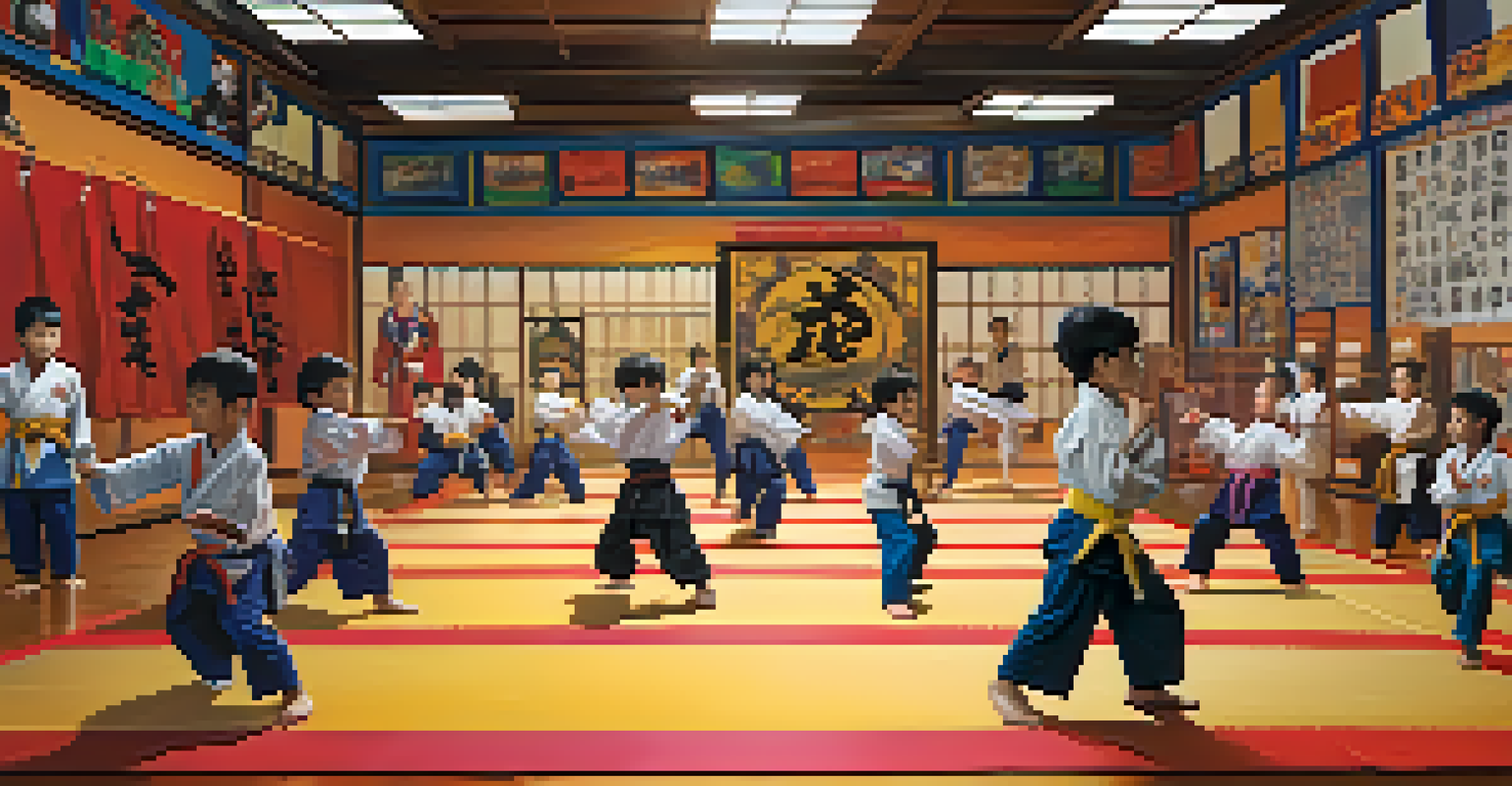Martial Arts in Children's Literature: Lessons and Values

The Role of Martial Arts in Children's Stories
Martial arts often serve as a backdrop in children's literature, providing a thrilling context that captures young imaginations. These stories often feature characters who practice martial arts, showcasing their skills while embarking on exciting adventures. By integrating martial arts, authors can engage readers with action-packed narratives that also teach important life lessons.
The ultimate aim of martial arts is not having to use them.
Not only do these tales entertain, but they also offer insights into discipline, respect, and perseverance. For instance, a young protagonist may face challenges that require them to hone their martial arts skills, illustrating the importance of hard work and determination. This duality of entertainment and education is what makes martial arts a compelling theme in children's literature.
Moreover, martial arts-themed stories can resonate with children from various backgrounds, promoting inclusivity. Characters from diverse cultures engaging in martial arts can help children from those backgrounds see themselves represented in literature. This representation fosters a sense of belonging and encourages young readers to explore their own identities.
Core Values Learned Through Martial Arts
At the heart of martial arts are core values such as respect, humility, and self-discipline. Children reading stories about martial arts often see characters who exemplify these traits, reinforcing the idea that such values are essential in real life. For example, a character might learn to bow to their opponent, highlighting the importance of respect in both competition and daily interactions.

Additionally, these stories often portray the journey of a young martial artist overcoming obstacles, which mirrors the struggles children face. By seeing characters navigate challenges, readers learn about resilience and the importance of perseverance. These narratives can inspire children to tackle their own difficulties with a positive mindset.
Martial Arts Teach Life Lessons
Children's stories featuring martial arts often impart essential values such as discipline, respect, and perseverance.
Furthermore, martial arts stories can teach the importance of teamwork and friendship. Characters often train together, supporting each other in their journeys. This emphasis on collaboration can motivate young readers to develop their own friendships and work together with peers to achieve shared goals.
Famous Martial Arts Characters in Children's Literature
Many beloved children's books feature iconic martial arts characters that have become role models for young readers. For example, the character of Mulan in various adaptations showcases bravery and skill, embodying the spirit of a martial artist. Her journey not only entertains but also teaches about courage and making sacrifices for loved ones.
Martial arts is not about fighting; it's about understanding yourself.
Similarly, characters like the Teenage Mutant Ninja Turtles have become cultural icons, combining humor with martial arts action. These characters appeal to children while imparting lessons about teamwork, loyalty, and standing up for what is right. Through the adventures of these characters, young readers are encouraged to embrace their uniqueness and fight for justice.
By introducing children to these characters, authors can inspire them to explore martial arts themselves. This exposure can lead to increased interest in physical activity and self-defense, promoting a healthier lifestyle. Ultimately, these characters become more than just figures in a book—they spark imagination and encourage personal growth.
Martial Arts as a Metaphor for Life Lessons
In many children's stories, martial arts serve as a metaphor for life's challenges and victories. Characters may face a 'big bad' or a personal battle, paralleling the struggles children encounter as they navigate growing up. The process of training and mastering skills in martial arts can symbolize the journey of self-improvement that every child undertakes.
For instance, a story may illustrate how a character learns to lose gracefully in a martial arts competition, teaching readers about humility and acceptance. This lesson can resonate with young readers who may struggle with similar feelings in their own lives. By framing these experiences within the context of martial arts, authors provide relatable and powerful narratives.
Cultural Awareness Through Stories
Martial arts literature introduces young readers to diverse cultures, fostering empathy and appreciation for different traditions.
Moreover, martial arts can represent the idea of balance in life. Many stories highlight the importance of balancing school, friendships, and other responsibilities while pursuing martial arts. This theme encourages children to find harmony in their own lives, promoting a well-rounded approach to personal development.
Martial Arts and Cultural Awareness
Children's literature featuring martial arts often introduces readers to various cultures and traditions. This exposure can foster cultural awareness and appreciation, showcasing the rich histories behind different martial arts disciplines. For instance, stories centered around karate or kung fu can provide insights into their origins and significance within specific cultures.
By weaving cultural elements into narratives, authors can inspire curiosity about the world. Children may feel motivated to learn more about different cultures or even try martial arts themselves. This engagement with diverse traditions promotes empathy and open-mindedness among young readers.
Additionally, understanding cultural nuances within martial arts stories can help children appreciate values like respect and honor in broader contexts. These lessons can translate into their daily lives, encouraging them to engage with peers from different backgrounds with kindness and understanding.
The Impact of Martial Arts Literature on Young Readers
Martial arts literature can have a profound impact on young readers, shaping their values and outlook on life. Stories that feature martial arts often encourage children to be active, fostering a love for physical activity. This can lead to increased confidence and a sense of accomplishment as they see characters achieve their goals through dedication.
Furthermore, these narratives can instill a sense of justice and moral responsibility. Characters who fight for what is right often inspire children to stand up against bullying or injustice in their own lives. This empowerment can be transformative, helping kids develop a strong moral compass.
Inspiration to Explore Martial Arts
Engaging narratives about martial arts can motivate children to pursue the discipline themselves, enhancing their physical fitness and social skills.
Ultimately, the influence of martial arts literature extends beyond the pages of a book. It can shape children's behavior, attitudes, and interactions with others, promoting positive values that last a lifetime. Through engaging storytelling, authors have the unique opportunity to guide young minds toward a brighter future.
Encouraging Young Readers to Explore Martial Arts
As children dive into stories featuring martial arts, they may feel inspired to explore the discipline themselves. Exposure to martial arts in literature can spark curiosity and motivate kids to join a local class or club. This not only promotes physical fitness but also helps them develop essential life skills like focus and discipline.
Parents and educators can play a crucial role in supporting this interest. By providing resources or encouraging kids to participate in martial arts programs, they can help nurture a passion for the sport. Additionally, discussing the lessons learned from stories can reinforce the values that martial arts promote.

Incorporating martial arts into children's lives can also create opportunities for social interaction and teamwork. Whether training with friends or participating in competitions, children can build connections and develop social skills. Ultimately, the journey into martial arts can enhance their lives in numerous ways, both on and off the mats.